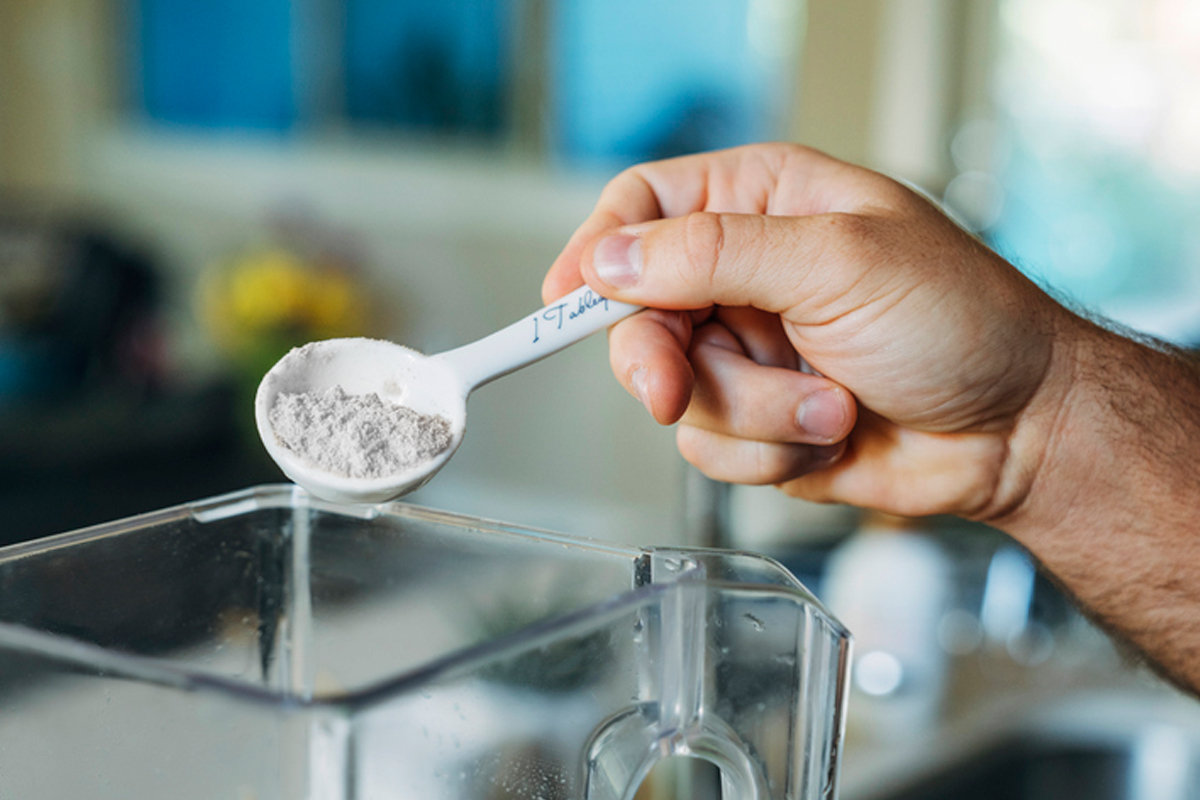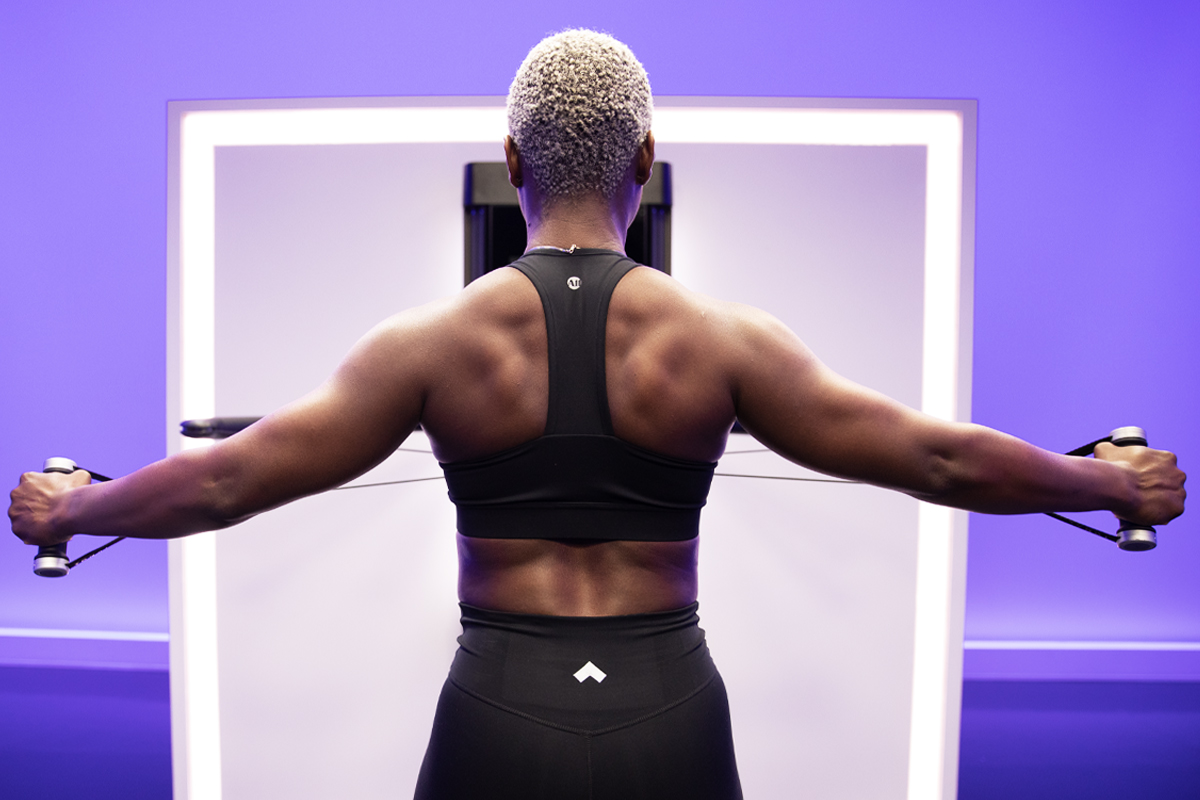If you’re thinking about taking collagen for muscle recovery or adding a supplement to your routine, here’s what you need to know.

Touted by marketers as the silver bullet for youthful skin, strong nails, and voluminous hair, collagen has earned a reputation as the go-to beauty supplement. And, to its credit, there’s some evidence to back those claims. So, what about using collagen for muscle recovery?
Collagen is, after all, a protein, and protein is the building block of muscle, so it’s reasonable to wonder about recovery-related benefits. How does a collagen supplement stack up to your standard whey protein shake when it comes to easing soreness and aiding hypertrophy?
To get the answers to those questions and more, we looked at the research and consulted with a registered dietitian and an exercise physiologist. If you’ve wondered about collagen for muscle repair or have been considering adding collagen to your routine but aren’t sure if it’s worth your time (and money), read on.
What Does Collagen Do in the Body?
Accounting for about one-third of the body’s protein, collagen is the most abundant type of protein.
“[Collagen] is used to make connective tissue, which is a major component of bone, skin, muscles, tendons, and cartilage,” says Danielle Gaffen, MS, RDN, LD, founder of Eat Well Crohn’s Colitis. Thanks to its mesh-like configuration, it makes for effective structural “scaffolding.” “It helps to make tissues strong and resilient and able to withstand stretching.”
However, collagen production naturally decreases with age, starting in the late teens and early 20s. By the time you’re in your 40s, you may lose up to 1 percent of your collagen each year. According to Gaffen, lifestyle factors, like smoking, alcohol consumption, a poor diet, excessive sun exposure, and lack of sleep and exercise can hasten that deterioration. To help prevent wrinkles, saggy skin, and aching joints, individuals often look to boost their collagen intake, either through dietary changes or supplementation.
What Are Collagen Supplements?
In the body, collagen is made from amino acids, the molecules that form protein. Some of those amino acids, known as essential amino acids, come from protein and collagen-rich foods, like meat, fish, bone broth, and gelatin, while non-essential amino acids are made by the body using other amino acids and biological compounds.
Collagen supplements, which are usually sold in powder or pill form, are developed with a distinct blend of amino acids that specifically support the body’s production of collagen. The sources of collagen for supplements are typically bovine (beef) or marine (seafood).
Collagen supplements are also typically hydrolyzed, which means they’ve undergone a process by which their long amino acid chains are broken down into shorter peptides. “These peptides are then easily absorbed through the gastrointestinal tract,” Gaffen says.
Twenty-eight different types of collagen have been identified, with types I, II, III, IV, and V being the most common. Some collagen supplement labels tout different benefits based on the type of collagen used, but much more research is needed to determine the validity of those claims.
Should You Supplement with Collagen for Muscle Recovery?
If you’re looking for a post-workout supplement that can fuel muscle recovery and optimize strength and volume gains, collagen is not your best bet, even though collagen supplements often contain 10 to 20 grams of protein.
“Collagen is an incomplete protein. It doesn’t have all essential amino acids,” says Todd Buckingham, Ph.D., visiting professor of exercise science in the Department of Movement Science at Grand Valley State University in Allendale, Michigan. (Tryptophan, typically associated with turkey dinners and Thanksgiving day naps, is the absent amino.) To repair damaged muscle fibers and build new muscle, the body needs adequate amounts of all nine essential amino acids, including tryptophan. Therefore, a powder or shake that contains 20 to 25 grams of complete protein will be more effective in facilitating muscle protein synthesis than the same amount of collagen.
While it might not be useful to take collagen for muscle recovery, if you’re recovering from a connective tissue injury, like a sprain, or struggling with joint pain, collagen supplementation may help you heal and move with less discomfort. A recent systematic review of 15 randomized control trials found that collagen peptide supplementation was “most beneficial in improving joint functionality and reducing joint pain.” Unsurprisingly, the same review found that collagen “did not have a significant impact on MPS (muscle protein synthesis).”
While the research is promising for injured athletes, Buckingham cautions that you can’t just start taking collagen and expect to feel better—you also need the stimulus of rehab or a corrective exercise program. “It’s just like how you’re not going to magically get bigger muscles by just drinking whey protein and not lifting weights,” he says.
5 Tips for Using Collagen Supplements Effectively
Generally speaking, collagen supplements aren’t necessary. You can increase your collagen intake by eating more foods that are naturally high in collagen, or incorporating options like bone broth into your diet. That said, supplements are convenient and easy, especially for people who eat on the run or prefer not to consume high amounts of animal-based proteins. (However, it’s important to note that collagen supplements are not vegan or vegetarian; all are made from animals or fish).
While it may not be beneficial to use collagen for muscle recovery, if you do decide to experiment with collagen supplements for other reasons, here are a few expert-backed tips:
- As with any supplement, look for certification from the National Sanitation Foundation (NSF). This label indicates that the product has been tested by a third-party organization and meets basic safety standards.
- The potential risks and side effects of collagen supplementation are relatively minimal, but according to Gaffen, you may experience symptoms like bloating, heartburn, and feelings of fullness. Keep that in mind as you plan when to test new products.
- If you have any food allergies, especially to seafood or animal products, make sure you know the source of your collagen before taking it.
- Mix collagen powder with orange juice or combine it with another source of vitamin C, as vitamin C is essential to collagen synthesis.
- While protein supplements are usually consumed after a workout, the general protocol for collagen supplementation is an hour before physical activity.
The information provided in this article is for educational and informational purposes only. Individuals with pre-existing health conditions, injuries, or concerns should consult with their healthcare provider before trying a new exercise or nutrition regimen.


